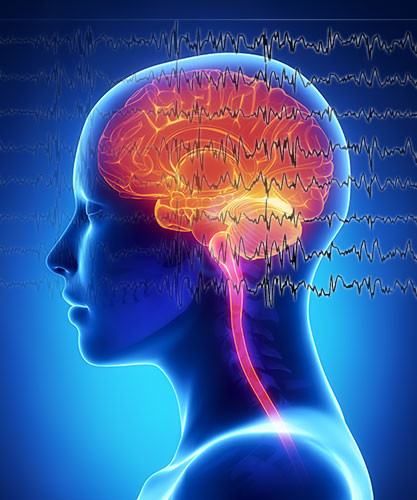Definition
Encephalopathy is a term used to describe damage or disease affecting the brain. The word encephalopathy itself comes from Greek, meaning "suffering in the head." The inhabitants of Greece used this word to explain when there was severe pain inside the head.
This disease occurs when there is a change in the brain's working process or a change in the body affecting the brain. These changes can impact consciousness and mental status, causing confusion and even personality changes.
Metabolic encephalopathy occurs when there are other conditions such as diabetes, liver failure, kidney failure, or heart failure, making it difficult for the brain to function properly. For example, when blood sugar is too high in patients with diabetes, it can cause confusion and even coma. The term metabolic encephalopathy was first used in 1912 when a scientist named Kinner Wilson tried to explain the status of global cerebral dysfunction or the status when there is a general brain abnormality caused by systemic stress throughout the body, with clinical symptoms ranging from mild to severe, including loss of consciousness.
Metabolic encephalopathy is the most common complication in patients treated in the ICU, and its symptoms serve as a warning of the onset of systemic organ failure. Improvement in symptoms of metabolic encephalopathy is associated with the successful treatment of other underlying diseases such as diabetes, liver disorders, and kidney disorders.
Causes
The causes of encephalopathy are varied, the most common being conditions where body tissues lack oxygen supply and toxic agents. Conditions like anemia, lung disease, heart and blood vessel diseases (including heart attacks), Stokes-Adams syndrome, heart rhythm disorders, hypotension, and hypertension can cause metabolic encephalopathy due to disrupted oxygen flow in the body.
Other systemic diseases such as liver disorders, kidney disorders, pancreatic disorders, malnutrition and vitamin deficiencies, endocrine system abnormalities, fluid and electrolyte imbalances, blood vessel inflammation, infections and sepsis, and malignant tumors like cancer can also cause metabolic encephalopathy.
Additionally, several toxic agents such as alcohol, sedatives like narcotics and barbiturates, psychiatric medications like antidepressants and anticholinergic agents, heavy metals, phosphates, and organic solvents, and other drugs not used as indicated like anticonvulsants, penicillin antibiotics, and corticosteroid anti-inflammatory drugs can also cause metabolic encephalopathy.
Risk factor
Several risk factors are associated with an increased incidence of metabolic encephalopathy, including:
- Age over 70 years
- Male gender
- Malnutrition
- Substance abuse
- Health conditions with cognitive impairment
- Limited physical condition
- Excessive drug use (more than five types of drugs at the same time)
- Vision or hearing impairments
- History of head injury and previous loss of consciousness
- Unhealthy lifestyle, excessive consumption of fast food
Symptoms
Hypertension-induced encephalopathy can lead to the emergence of several symptoms such as:
- Severe headache
- Blurred vision
- Confusion
- Seizures
- Fainting
- Loss of concentration
- Impaired motor coordination
- Loss of problem-solving abilities or decision-making.
In addition, encephalopathy can also cause symptoms such as muscle twitching, difficulty swallowing or speaking, muscle weakness in one limb, and a decrease in consciousness, ranging from appearing drowsy to coma.
Diagnosis
Doctors will conduct an examination starting with an interview, physical examination, and supporting tests.
During the interview session, the doctor will communicate with the patient if the patient can do so. If the patient is unable to communicate, the doctor may ask the patient's family (if available) several questions to collect information. These questions may cover the main complaints, accompanying complaints, duration of the complaints, past medical history, current treatment history, family medical history, daily activities, and physical activity.
This is followed by a physical examination. The physical examination includes checking the patient's general condition, including consciousness, blood pressure, body temperature, respiratory rate, and pulse. Then the doctor will conduct a thorough examination from head to toe to ensure no other medical conditions are overlooked.
Next, the doctor will conduct several supporting tests. Possible supporting tests include blood samples to check for infection, electrolyte imbalances, liver function, kidney function, blood sugar levels, and blood gas levels. The doctor may also take urine samples if the patient is suspected of having used narcotics and illegal substances previously.
Lumbar puncture by taking brain and spinal fluid samples can be recommended if indicated. The doctor may recommend a CT scan and MRI to check for infections, anatomical changes in the brain, and swelling. An Electroencephalogram or EEG can also be recommended if necessary, especially in cases of seizures, to check brain wave patterns. Not all supporting tests need to be done. The doctor will only recommend those relevant to the patient's clinical symptoms.
Management
The treatment of metabolic encephalopathy depends on the underlying disease and its severity. If the cause of metabolic encephalopathy is uncontrolled blood sugar levels, the treatment involves lowering the blood sugar first.
Similarly, patients with liver disorders, kidney disorders, and heart failure require specific treatments for their conditions. Treating encephalopathy often involves multiple specialists, depending on the primary cause of the encephalopathy.
A neurologist will help manage and provide supportive therapy for the patient's nerve function, but the main treatment remains with the specialist handling the primary cause. Additionally, if encephalopathy improves, other therapies like medical rehabilitation are necessary to restore the patient's function to normal.
Complications
Complications of metabolic encephalopathy include prolonged decreased consciousness, depression, tremors, permanent brain damage, and even death. Therefore, proper treatment can reduce the risk of complications.
Prevention
Although metabolic encephalopathy cannot be entirely prevented, several tips are recommended for maintaining general health, including:
- Keeping the brain active with daily activities and tasks like solving crosswords or playing puzzles
- Eating a balanced diet and meeting fluid needs by drinking 1.5 - 2 liters of water daily. Consult a doctor for fluid needs if you have heart or kidney failure
- Avoiding continuous exposure to chemicals and heavy metals
- Avoiding smoking, narcotics, and alcohol
- Always taking medication according to the doctor's instructions and supervision
- Exercising and engaging in physical activity at least three times a week for a minimum of 30 minutes
- Controlling blood sugar levels, blood pressure, and body weight to stay within recommended limits
When to see a doctor?
See a doctor immediately if there is a decrease in consciousness, especially if you have a history of diabetes, kidney failure, or heart failure, or are on treatment with more than five types of drugs simultaneously. Decreased consciousness can include confusion, frequent drowsiness, and personality changes. Since this condition is critical, you can go to the nearest emergency department.
Looking for more information about other diseases? Click here!
- dr Ayu Munawaroh, MKK
Berisavac I., Jovanovic DR., et al., (2017). How to recognize and treat metabolic encephalopathy in Neurology intensive care unit. Retrieved 14 September 2022, from https://www.neurologyindia.com/article.asp?issn=0028-3886%3Byear%3D2017%3Bvolume%3D65%3Bissue%3D1%3Bspage%3D123%3Bepage%3D128%3Baulast%3DBerisavac%3Btype%3D3
Brain Injury Association of America - An Overview of Toxic Metabolic Encephalopathy: An Acquired Brain Injury. (2019). Retrieved 14 September 2022, from https://www.biausa.org/public-affairs/media/an-overview-of-toxic-metabolic-encephalopathy-an-acquired-brain-injury
MedicineNet - Encephalopathy: Types, Causes, Symptoms, Stages, & Treatment. (2022). Retrieved 14 September 2022, from https://www.medicinenet.com/encephalopathy/article.htm
Supanc V., Vargek-Solter V., Demarin V., (2003). Metabolic Encephalopathies. Retrieved 14 September 2022, from https://www.researchgate.net/publication/27199289_Metabolic_Encephalopathies
WebMD - Encephalopathy. (2021). Retrieved 14 September 2022, from https://www.webmd.com/brain/what-is-encephalopathy












